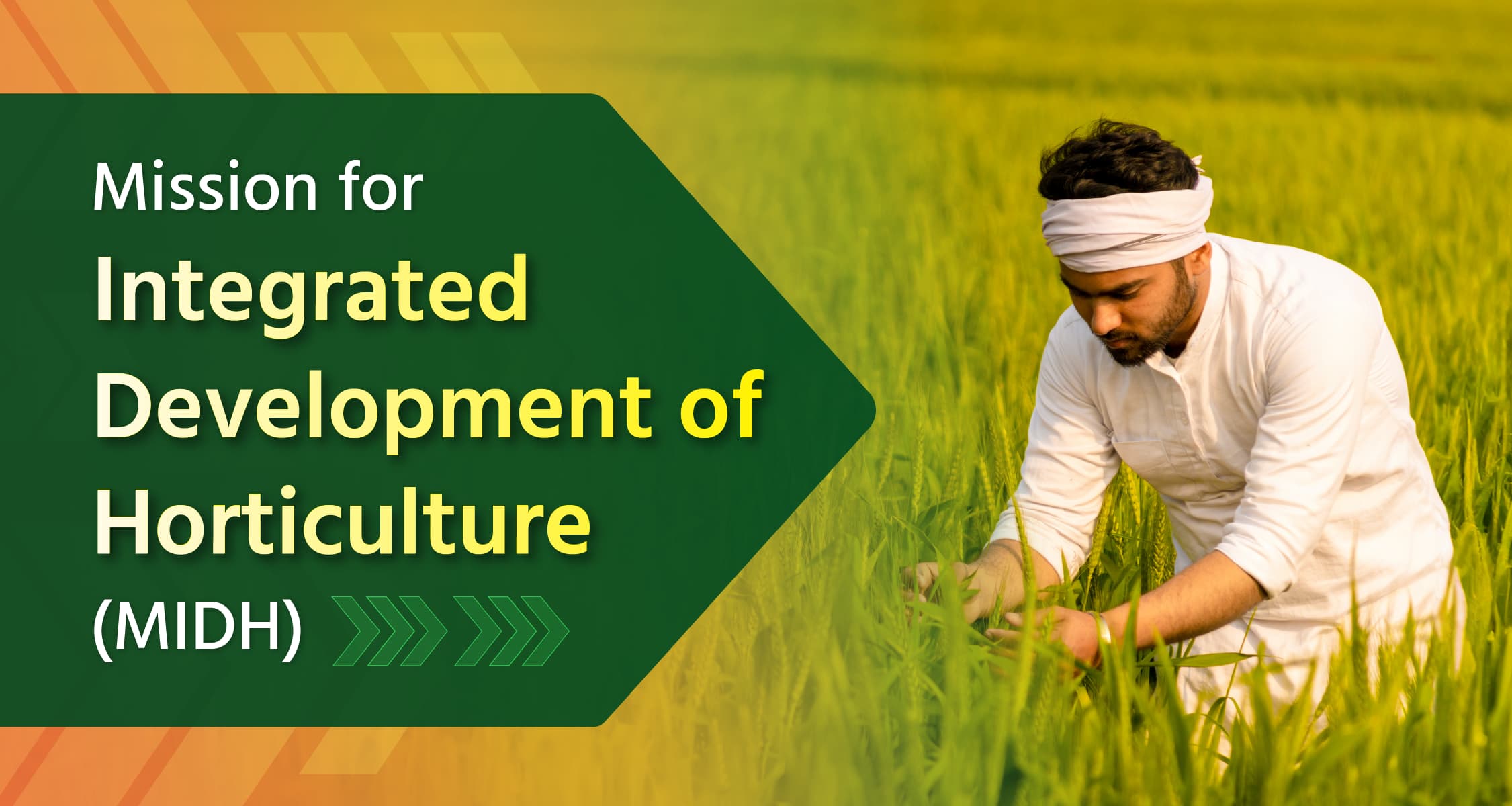Mission for Integrated Development of Horticulture (MIDH)

The Mission for Integrated Development of Horticulture (MIDH) is a centrally sponsored scheme launched by the Government of India in 2014-15. The aim of this scheme is to promote the overall development of the horticulture sector, including fruits, vegetables, spices, flowers, aromatic plants, coconut, cashew, cocoa, and bamboo. This scheme provides assistance for various activities such as the creation of infrastructure facilities, the promotion of extension services, post-harvest management, marketing and processing of horticultural products, and research and development. The primary objective of this scheme is to increase horticultural production, improve nutritional security, and provide income support to farming families. This scheme is implemented by the Ministry for Agriculture and Farmers' Welfare, Government of India.
Objectives of the Mission for Integrated Development of Horticulture
- Increase in Horticultural Production and Productivity: Improving the country's nutritional security by promoting the cultivation of fruits, vegetables, spices, flowers, aromatic plants, coconut, cashew, cocoa, and bamboo.
- Rural Employment Opportunities: Creating employment opportunities in rural areas by promoting horticulture-based entrepreneurship.
- Adoption of New Technologies and Best Practices: Encouraging the adoption of new technologies and best practices in horticultural cultivation, post-harvest management, marketing, and processing.
- Infrastructure Development: Develop infrastructure such as cold storage, pack houses, ripening chambers, and processing units for the growth of the horticulture sector.
- Promotion of Organic Farming: Encouraging the use of organic farming practices and reducing the use of chemical fertilizers and pesticides.
- Income Support for Farmers: Providing income support to farmers by promoting value-added products and market linkages.
Benefits of MIDH
- Increase in Production and Productivity: Through this scheme, horticultural production and productivity are increased by following new technologies and best practices. This leads to an increase in farmers' incomes and improves their livelihoods.
- Diversification of Crops: Under this scheme, the cultivation of horticultural crops such as fruits, vegetables, spices, flowers, aromatic plants, coconut, cashews, cocoa, and bamboo is encouraged. This brings diversity to the agricultural sector and reduces dependence on traditional crops.
- Nutritional Security: The efforts of the Horticultural Development Mission promote the cultivation of horticultural crops, thereby improving the nutritional security of the country.
- Employment Generation: The aim of this scheme is to promote horticulture-based entrepreneurship and create employment opportunities in rural areas.
- Infrastructure Development: This includes the construction of basic facilities such as cold storage, pack houses, ripening chambers, and processing units. This improves post-harvest management and marketing of horticultural crops.
- Promotion of Organic Farming: The scheme aims to promote the use of organic farming practices, which help in improving soil health and reducing environmental pollution.
Documents for Application
To apply for the Horticulture Development Mission, the following documents are required:
- Identity Proof (Aadhar Card, Voter ID, PAN Card, etc.)
- Address Proof (Aadhar Card, Voter ID, Utility Bill such as Electricity Bill, Water Bill, Gas Bill, etc.)
- Land Ownership Documents (if applicable)
- Bank Account Details
- Project Report or Proposal
- Passport Size Photograph
- Any other relevant documents specified by the concerned department
How to Apply for the Scheme
- First, visit the official website of MIDH: http://midh.gov.in
- Click on the "Schemes" tab and select "Mission for Integrated Development of Horticulture (MIDH)" from the drop-down menu.
- Read the guidelines and eligibility criteria carefully before applying for the scheme.
- Download the application form from the website or obtain it from the relevant department.
- Fill out the application form with all the required information and attach the necessary documents.
- Submit the application form to the Ministry of Agriculture & Farmers' Welfare department or through the online portal.
- After submission, you can track the status of your application through the online portal or by contacting the Ministry for Agriculture and Farmers' Welfare department.
Have you ever availed of the Mission for Integrated Development of Horticulture (MIDH) Scheme? If you want any other information related to agriculture, then do let us know by commenting. And if you found this information useful, please like it and share it with your fellow farmers. For more information on ongoing government schemes for farmers, follow the 'Farmer's Scheme' channel.
Frequently Asked Questions (FAQs)
Q: When was the National Horticulture Mission initiated?
A: The National Horticulture Mission (NHM) was launched in India on May 4, 2005. This mission is implemented by the Ministry of Agriculture and Farmers’ Welfare, Government of India.
Q: In which states is the National Horticulture Mission implemented?
A: The National Horticulture Mission (NHM) is implemented in all states and Union Territories of India. This mission is working towards the development and progress of horticulture in the country. Under this scheme, horticultural activities are being promoted, concerned basic infrastructure is being developed, and farmers are being encouraged to adopt modern technologies and best practices in these states and UTs.
Q: What is MIDH?
A: The MIDH is a centrally sponsored scheme initiated by the Government of India for the integrated development of horticulture. The objective of this scheme is to promote the overall development of the horticulture sector, including fruits, vegetables, spices, flowers, aromatic plants, coconut, cashew, cocoa, and bamboo.
Q: What is the objective of MIDH?
A: The objective of MIDH is to promote the overall development of the horticulture sector, including fruits, vegetables, spices, flowers, aromatic plants, coconut, cashew, cocoa, and bamboo.
Please login to continue

Get free advice from a crop doctor
